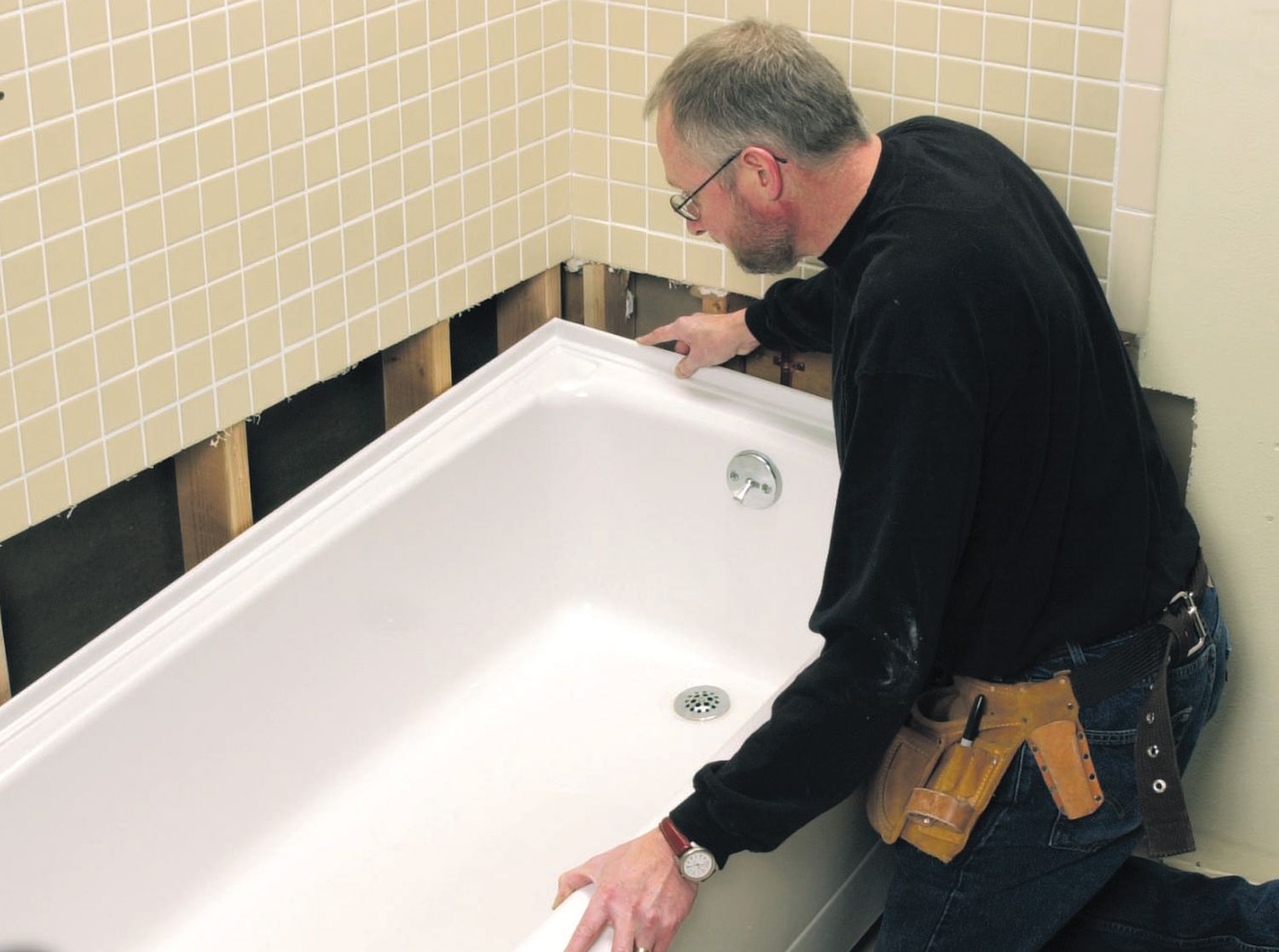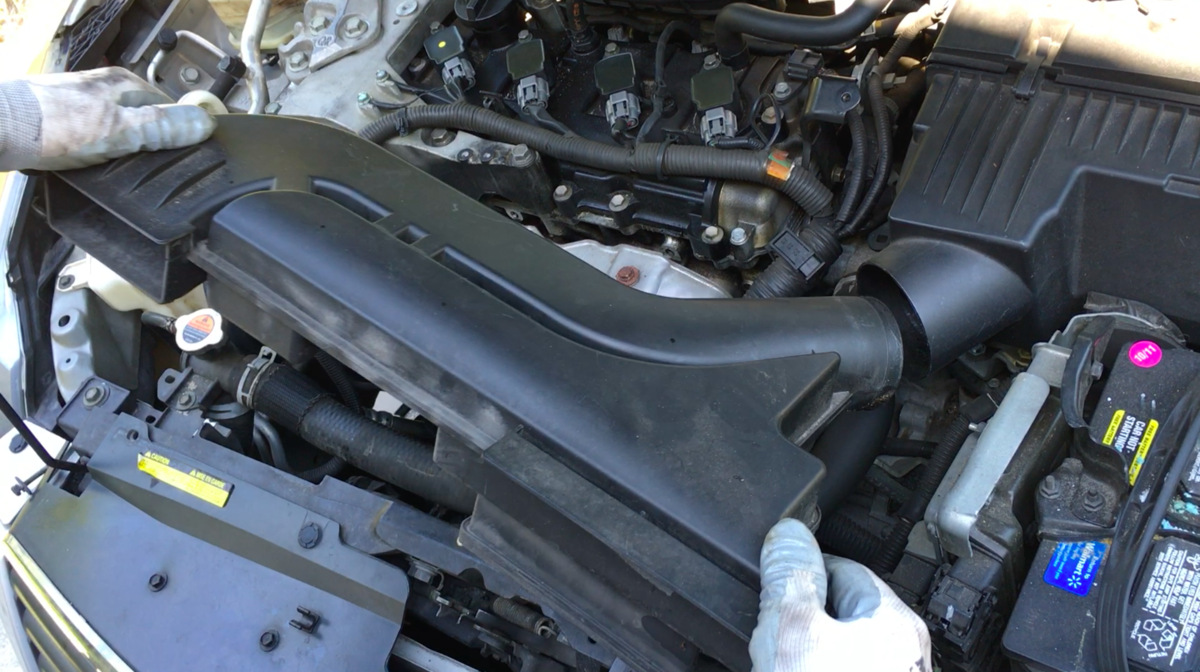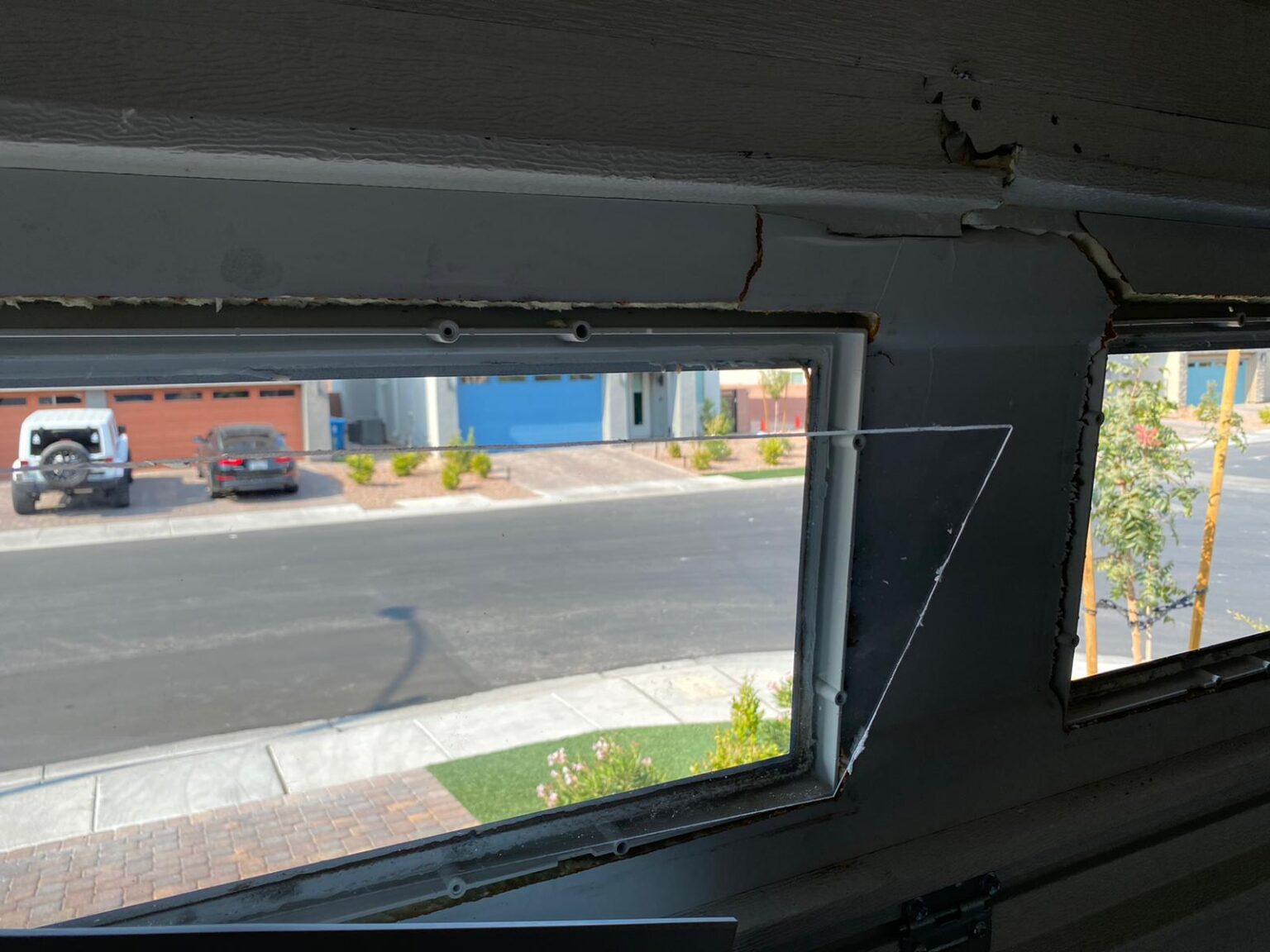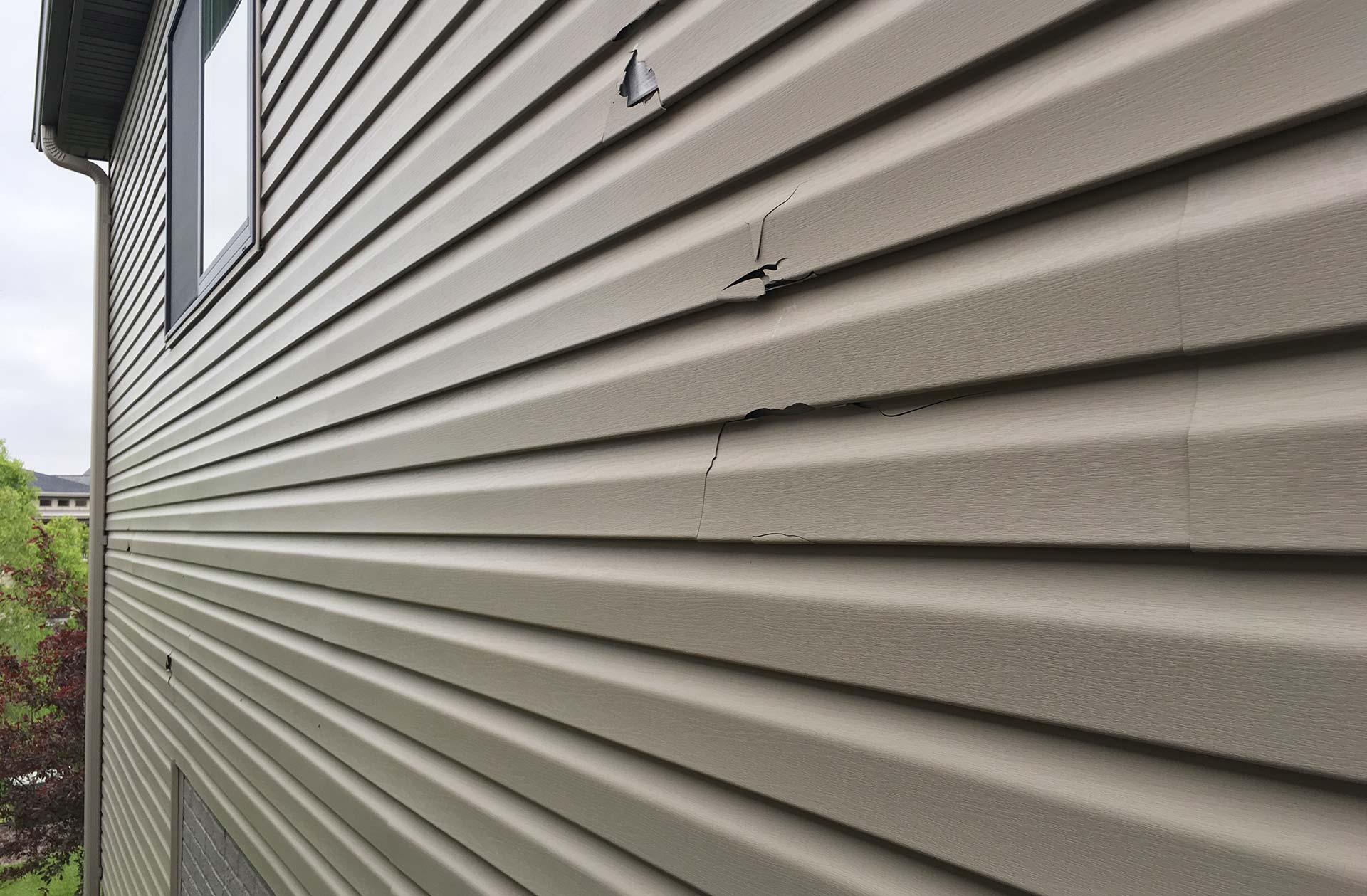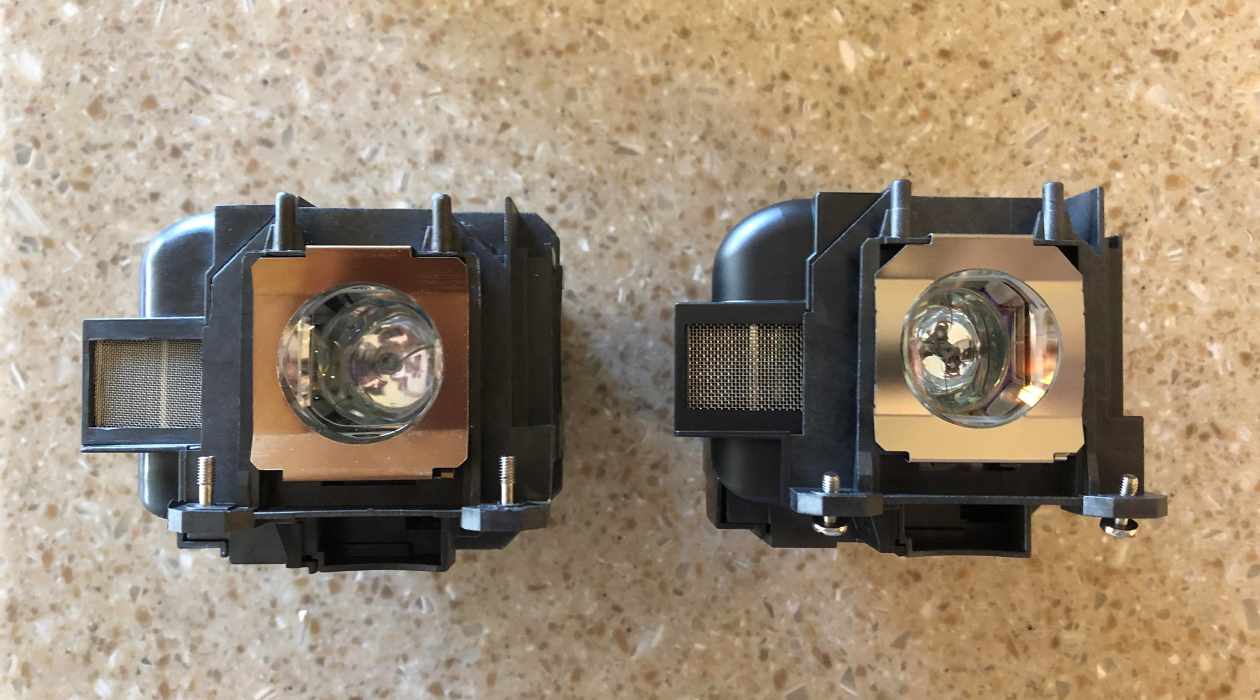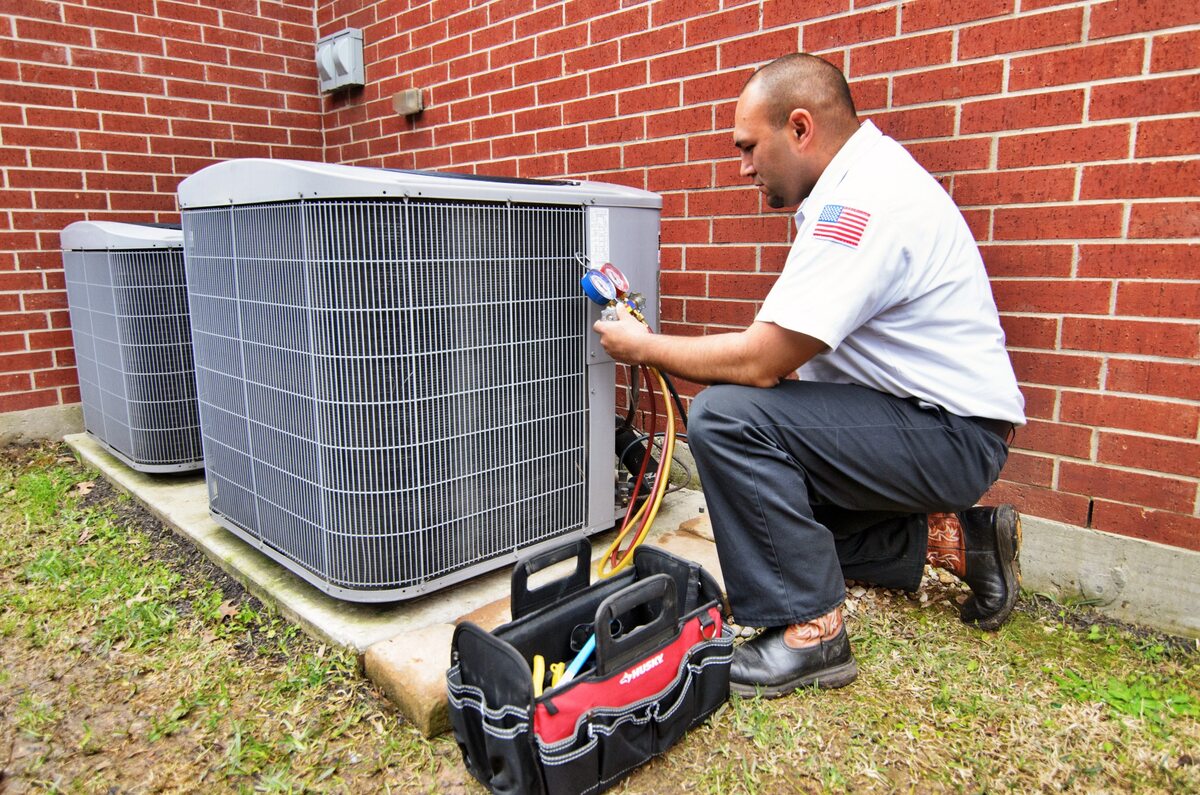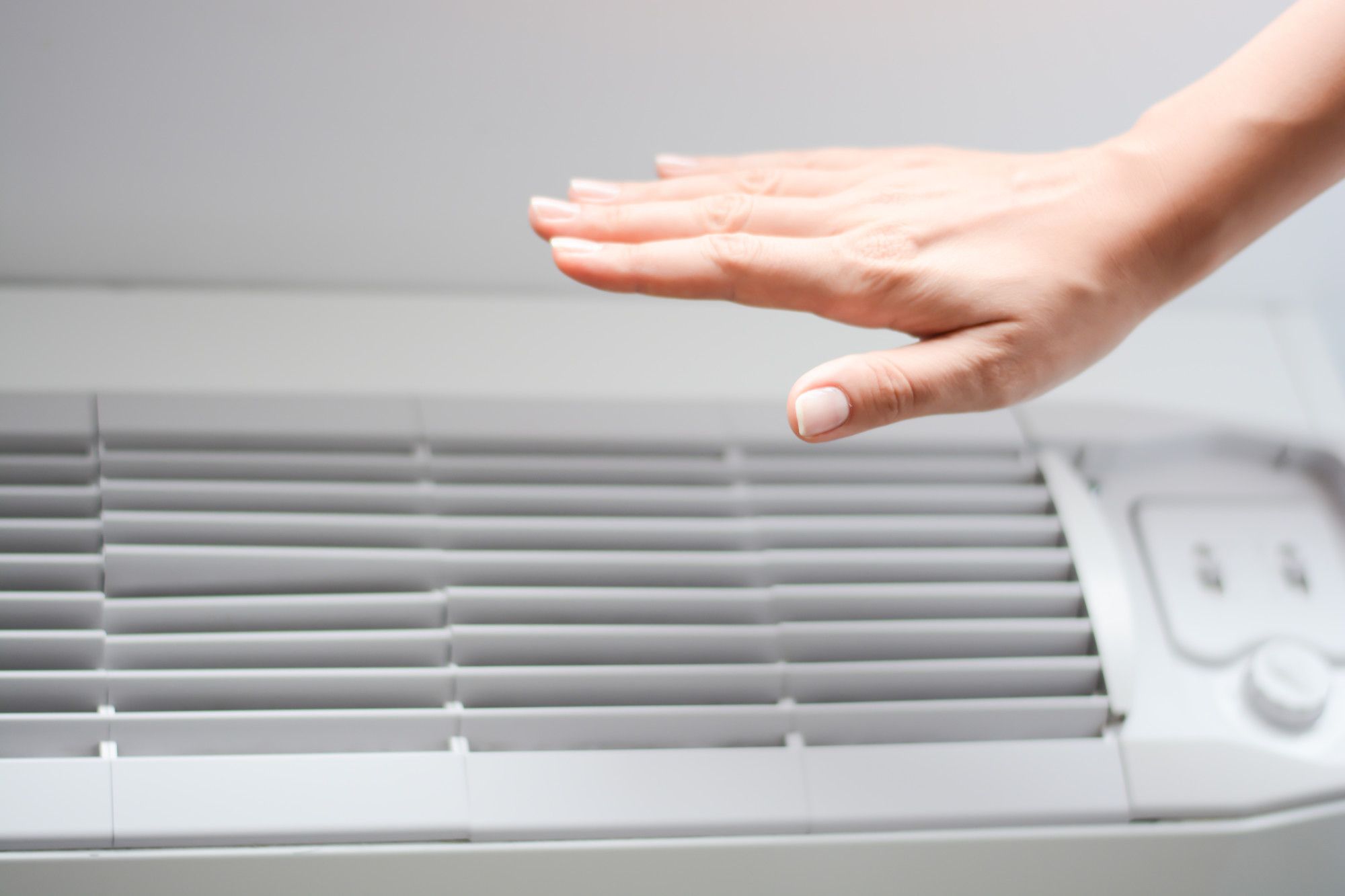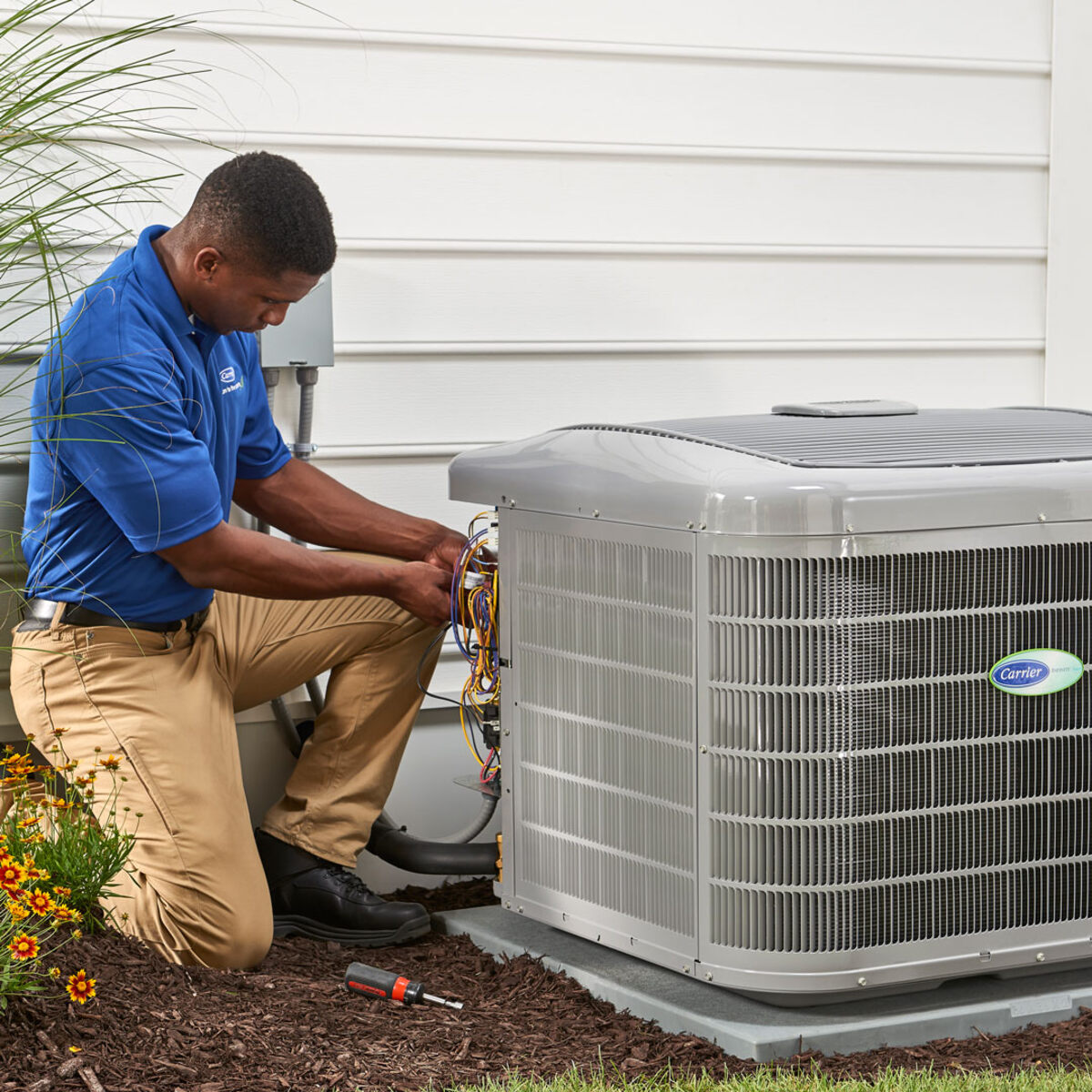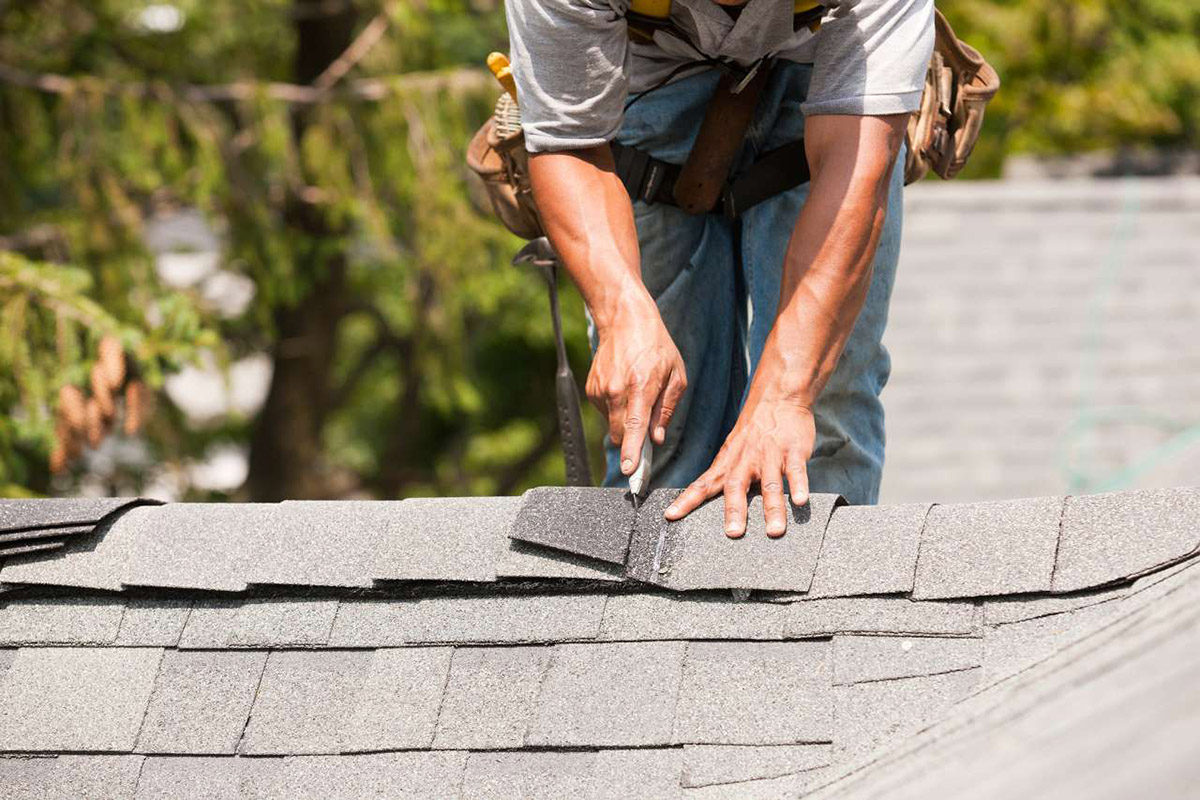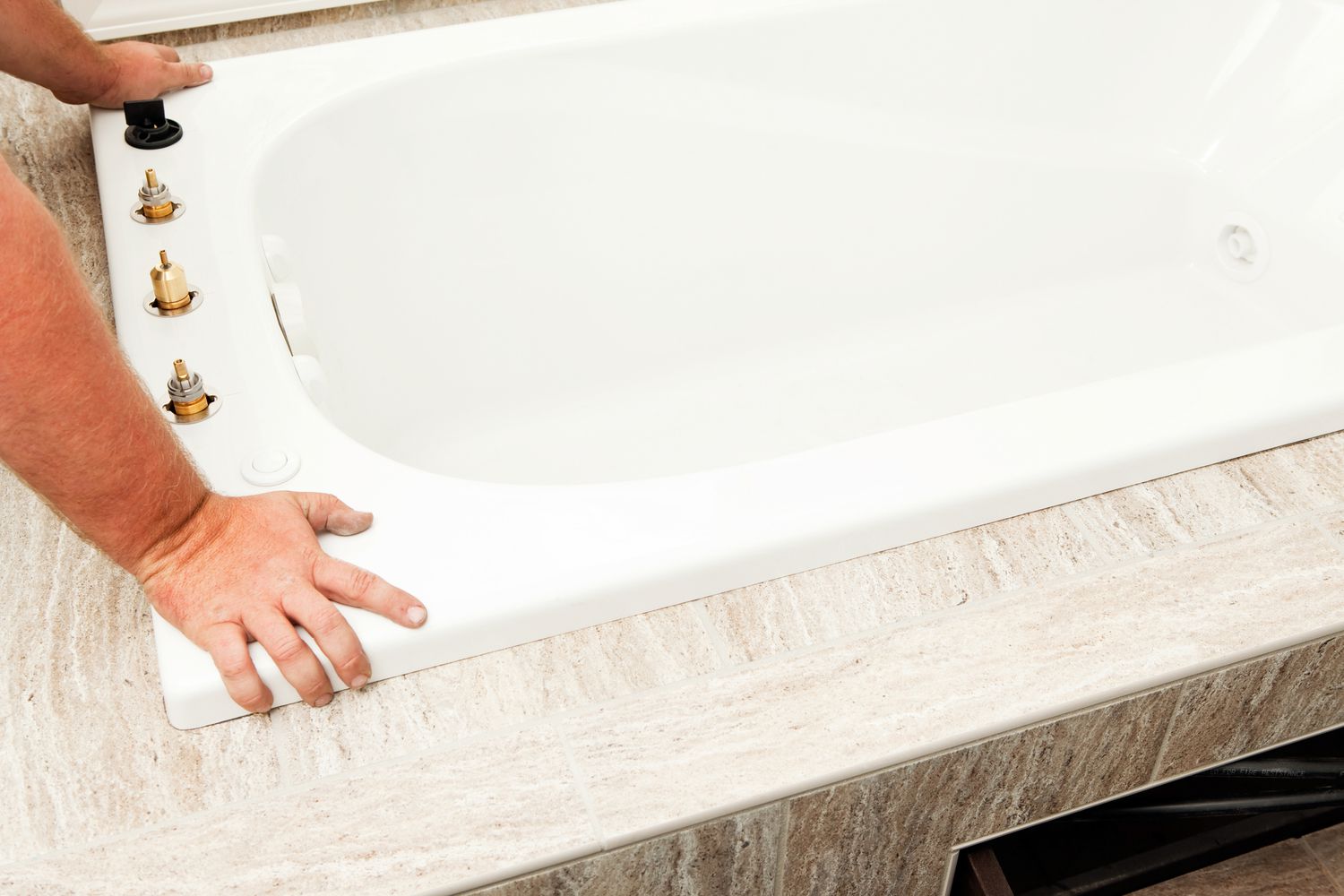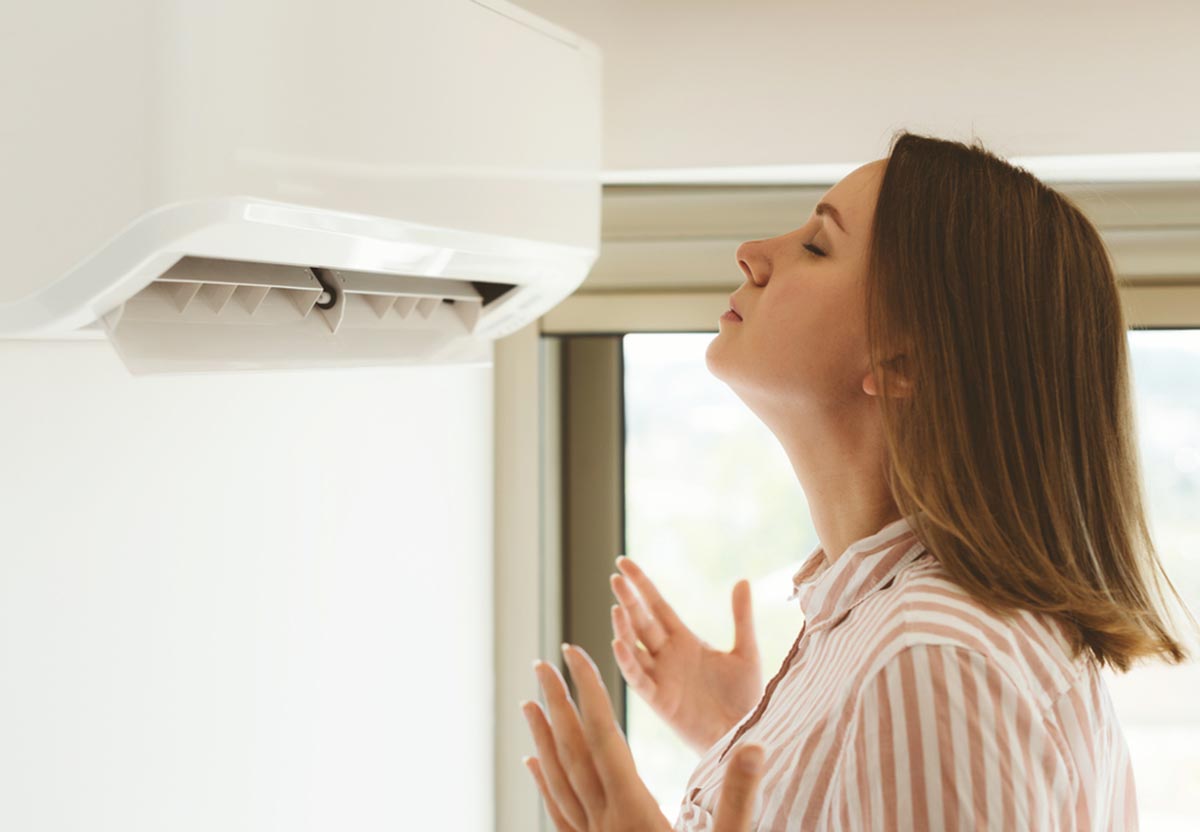Home>Home Maintenance>When To Replace Your Air Conditioning System


Home Maintenance
When To Replace Your Air Conditioning System
Modified: March 6, 2024
Learn when it's time to replace your air conditioning system with these home maintenance tips. Ensure the comfort of your home with a new and efficient AC unit.
(Many of the links in this article redirect to a specific reviewed product. Your purchase of these products through affiliate links helps to generate commission for Storables.com, at no extra cost. Learn more)
Introduction
Welcome to the world of home maintenance! As a homeowner, it’s essential to stay on top of repairs and replacements to ensure your home remains comfortable and in good condition. One crucial aspect of home maintenance is keeping your air conditioning system in optimal shape.
An air conditioning system is a significant investment that provides relief from the scorching heat during the summer months. However, like any mechanical system, it has a limited lifespan. Over time, wear and tear can cause the system to become less efficient, leading to decreased cooling performance, higher energy bills, and potential breakdowns.
Knowing when to replace your air conditioning system is key to maintaining a comfortable indoor environment and avoiding inconvenience. In this article, we will explore the signs that indicate it may be time to replace your air conditioning system, the benefits of doing so, and important factors to consider before making the decision.
So, read on to discover the telltale signs of an aging air conditioning system and when it’s time to bid farewell to your faithful cooling companion!
Key Takeaways:
- Signs of an aging air conditioning system include decreased cooling efficiency, frequent breakdowns, unusual noises, increasing energy bills, and the age of the unit. These signs indicate when it may be time to consider a replacement.
- Replacing an aging air conditioning system with a new, energy-efficient model can lead to increased comfort, improved air quality, potential cost savings, and reduced environmental impact. Consulting with HVAC professionals is crucial for expert recommendations and proper system sizing.
Read more: When Should You Replace HVAC System
Signs of an Aging Air Conditioning System
An air conditioning system, like any other mechanical equipment, ages over time. It’s important to be vigilant and recognize the signs that indicate your system is reaching the end of its lifespan. Here are some telltale signs that your air conditioning system may be getting older:
- Decreased Cooling Efficiency: If you notice that your air conditioning system is no longer providing the same level of cooling that it used to, it may be a sign of an aging system. Your home may take longer to cool down, or the cool air may feel weaker or less consistent throughout the house.
- Frequent Breakdowns and Repairs: As an air conditioning system ages, it becomes more susceptible to breakdowns and requires more frequent repairs. If you find yourself calling for repairs more often than usual, it may be a sign that your system is nearing the end of its lifespan.
- Unusual Noises: An aging air conditioning system may start making unfamiliar and loud noises during operation. These noises can range from grinding or squealing sounds to rattling or banging. If you notice any unusual sounds coming from your system, it’s advisable to have it inspected by a professional.
- Increasing Energy Bills: An aging air conditioning system tends to become less energy efficient over time. As a result, you may notice a steady increase in your monthly energy bills, even if your usage remains consistent. Newer, more efficient systems utilize advanced technology to minimize energy consumption, so replacing your old system can potentially lead to significant cost savings.
- Age of the Air Conditioning Unit: Generally, an air conditioning system has a lifespan of around 10 to 15 years. If your system is approaching or exceeding this age range, it’s a good indication that it may be time to consider a replacement.
Note: It’s important to remember that these signs don’t automatically mean your air conditioning system needs to be replaced. Consulting with a professional HVAC technician is crucial to accurately diagnose the condition of your system and provide appropriate recommendations.
Now that you are aware of the signs of an aging air conditioning system, let’s explore the benefits of replacing your unit and why it may be a worthwhile investment.
Decreased Cooling Efficiency
One of the early signs of an aging air conditioning system is a noticeable decrease in cooling efficiency. You may find that your home takes longer to cool down or that the cool air is unevenly distributed throughout different rooms. This reduced efficiency can be attributed to various factors:
- Wear and tear: Over time, the components of your air conditioning system can become worn out or develop issues. This can impact the system’s ability to cool the air effectively, resulting in a less comfortable indoor environment.
- Refrigerant leaks: The refrigerant is a vital component for the cooling process. If your system is leaking refrigerant, it can lead to decreased cooling efficiency as it struggles to maintain the desired temperature.
- Deteriorating insulation: Insulation plays a crucial role in maintaining the efficiency of your air conditioning system. As insulation deteriorates over time, it can allow cool air to escape or hot air to seep in, making it harder for your system to keep your home cool.
- Clogged air filters: Air filters are responsible for trapping dust, dirt, and other particles that can hinder the performance of your system. If you don’t regularly clean or replace your air filters, they can become clogged, restricting airflow and reducing cooling efficiency.
- Outdated technology: Older air conditioning systems may use outdated technology that is not as energy-efficient as newer models. Upgrading to a more advanced system can significantly improve cooling efficiency and reduce energy consumption.
If you notice a decrease in cooling efficiency, it’s important to address the issue promptly to avoid further complications. A professional HVAC technician can diagnose the cause of the decreased efficiency and determine whether a repair or replacement is necessary.
Replacing your aging air conditioning system with a new, more efficient model can bring numerous benefits, including enhanced indoor comfort, improved air quality, and potential cost savings. In the next sections of this article, we will delve into these benefits and explore the factors to consider before making the decision to replace your air conditioning system.
Frequent Breakdowns and Repairs
If you find yourself calling for air conditioning repairs more often than usual, it may be a clear indication that your system is aging. As air conditioning systems age, various components can wear out or malfunction, leading to frequent breakdowns and the need for repairs. Here are some reasons you may experience these issues with an aging system:
- Worn-out parts: Over time, the components of your air conditioning system, such as the compressor, fan motor, or condenser coils, can wear out or become damaged. This wear and tear can cause the system to break down or operate inefficiently.
- Inadequate maintenance: Neglecting regular maintenance, such as cleaning or replacing air filters, lubricating moving parts, or inspecting electrical connections, can contribute to the deterioration of your system. Lack of maintenance can lead to more frequent breakdowns and the need for repairs.
- Lack of proper lubrication: Many parts of an air conditioning system require proper lubrication to operate smoothly. If these parts are not lubricated regularly, they can experience increased friction, leading to failures and breakdowns.
- Electrical issues: The electrical components of your air conditioning system can deteriorate over time, resulting in problems such as short circuits, faulty wiring, or overheating. These electrical issues can disrupt the functioning of your system and necessitate repairs.
- Refrigerant leaks: As an air conditioning system ages, the refrigerant lines can develop leaks, which not only reduce cooling efficiency but can also lead to frequent breakdowns. Low refrigerant levels can cause the system to overwork and strain, resulting in failures.
Frequent breakdowns and repairs can be frustrating and inconvenient, especially during the hottest days of summer. While occasional repairs are normal, frequent issues can be a sign that your system is nearing the end of its lifespan. Investing in a new air conditioning system can provide relief from constant repairs and offer greater peace of mind.
Replacing your aging system with a new air conditioning unit can save you the hassle and expense of recurring breakdowns. Newer systems are equipped with modern technologies and more reliable components, reducing the likelihood of malfunctions and breakdowns.
Furthermore, a new system typically comes with a manufacturer’s warranty, providing added protection and coverage in case of any unexpected issues. By upgrading to a new system, you can enjoy greater confidence in your cooling system’s performance and reliability.
In the next section, we will explore another sign of an aging air conditioning system: unusual noises. Stay tuned!
Unusual Noises
As your air conditioning system ages, you may start to notice unusual noises during its operation. These noises are not only annoying but can also be indicators of underlying issues within the system. If you hear any of the following sounds, it may be time to consider replacing your aging air conditioning system:
- Grinding: A grinding noise could indicate a problem with the motor bearings or a worn-out fan belt. Over time, these components can become loose or damaged, resulting in a grinding noise when the system is running.
- Squealing: A high-pitched squealing sound could be a sign of a loose or worn-out belt. The belt is responsible for driving the fan in your air conditioning system, and if it becomes worn or misaligned, it can create a squealing noise.
- Rattling or Banging: If you hear rattling or banging noises coming from your air conditioning unit, it may indicate loose or broken components. These noises can be caused by loose screws, fan blades hitting against debris, or even a failing motor.
- Hissing or Whistling: Hissing or whistling noises often indicate a refrigerant leak. As the refrigerant escapes from the system, it can create a hissing sound. If you suspect a refrigerant leak, it’s important to address it promptly, as it can lead to decreased cooling efficiency and potential damage to the system.
- Clicking: While a single click when the system starts or shuts off is normal, frequent clicking noises during operation may indicate an electrical issue. Faulty relays or electrical components can cause these clicking sounds.
Unusual noises from your air conditioning system should not be ignored, as they can be signs of more significant problems. If you experience any of these noises, it’s advisable to have a professional HVAC technician inspect your system. They can accurately diagnose the issue and determine whether a repair or replacement is necessary.
Replacing your aging air conditioning system with a new, updated model can not only eliminate these annoying noises but also provide you with a quieter and more pleasant indoor environment. Newer systems are designed with noise reduction features, allowing you to enjoy a peaceful and undisturbed cooling experience.
Next, we will discuss how an aging air conditioning system can lead to increasing energy bills. Stay tuned!
Read more: When To Replace Toilet
Increasing Energy Bills
If you’ve noticed a steady increase in your monthly energy bills, your aging air conditioning system could be a contributing factor. As air conditioning units age, they tend to become less energy-efficient, leading to higher energy consumption and increased utility costs. Here are some reasons why your aging system may be causing your energy bills to soar:
- Reduced Efficiency: Over time, the components of your air conditioning system can wear out or become less efficient. This can result in the system having to work harder and longer to cool your home, using more energy in the process.
- Inadequate Insulation: Insufficient insulation in your home can cause cool air to escape and hot air to infiltrate, making your air conditioning system work harder to maintain the desired temperature. As a result, more energy is consumed, leading to higher utility bills.
- Leaking Ductwork: Older air conditioning systems may have deteriorating ductwork that develops leaks over time. Leaky ducts can cause air to escape before it reaches its intended destination, causing the system to work harder and use more energy to compensate.
- Outdated Technology: Older air conditioning systems may not be equipped with the latest energy-saving technologies found in newer models. Upgrading to a more energy-efficient system can help reduce energy consumption and, in turn, lower your monthly bills.
- Improper Maintenance: Neglecting regular maintenance, such as cleaning or replacing air filters, can reduce the efficiency of your air conditioning system. Dirty filters restrict airflow, forcing the system to work harder and consume more energy to cool your home.
By replacing your aging air conditioning system with a newer, energy-efficient model, you can potentially experience significant savings on your monthly energy bills. Newer systems utilize advanced technologies, such as variable speed motors and smart thermostats, which optimize energy usage and ensure efficient operation.
In addition to saving money, an energy-efficient air conditioning system is also better for the environment. Reduced energy consumption means fewer greenhouse gas emissions and less strain on natural resources. By making the switch to an energy-efficient system, you can contribute to a greener and more sustainable future.
Before making the decision to replace your air conditioning system, take into consideration factors such as the age of the unit, environmental impact, and health concerns. We will explore these important considerations in the next sections of this article.
Age of the Air Conditioning Unit
The age of your air conditioning unit is an important factor to consider when determining whether it’s time for a replacement. Most air conditioning systems have a typical lifespan of around 10 to 15 years, depending on various factors such as usage, maintenance, and quality. Here are a few considerations regarding the age of your unit:
- Decreased Performance: As an air conditioning unit ages, its performance tends to decline. You may notice that your system is no longer able to cool your home as effectively as it used to, or it may struggle to maintain a consistent temperature throughout your living spaces.
- Inefficiency: Older units are typically less energy-efficient compared to new models. As technology advances, air conditioning systems become more energy-efficient, utilizing features such as variable speed compressors and enhanced insulation. By upgrading to a newer unit, you can enjoy significant energy savings in the long run.
- Costly Repairs: As an air conditioning unit gets older, repairs become more frequent and may cost more as well. Aging components are more prone to failure, resulting in costly repair visits. If you find yourself spending a significant amount on repairs, it may be more cost-effective to invest in a new system.
- Obsolescence: Over time, technology and industry standards evolve. Older air conditioning units may lack the advanced features and capabilities found in newer models. Upgrading to a newer system ensures that you can take advantage of the latest innovations, such as smart thermostats and improved energy management.
- Warranty Coverage: Air conditioning units typically come with a manufacturer’s warranty that offers coverage for a certain period of time, usually around 5 to 10 years. As your system approaches the end of its warranty period, the cost of repairs or component replacement may fall solely on you. In such cases, it may be more economical to replace the unit rather than pay for expensive repairs.
While the age of your air conditioning unit is an important factor to consider, it should not be the sole determining factor. Other signs of an aging system, such as decreased cooling performance, frequent breakdowns, and unusual noises, should also be taken into account. It’s best to consult with a professional HVAC technician who can assess the overall condition of your system and provide sound recommendations based on their expertise.
Next, we will discuss some environmental considerations associated with aging air conditioning systems. Stay tuned!
Environmental Considerations
When considering whether to replace your aging air conditioning system, it’s important to take into account the environmental impact of your decision. Air conditioning systems can have a significant impact on energy consumption and greenhouse gas emissions. Here are some environmental considerations to keep in mind:
- Energy Efficiency: Older air conditioning units are typically less energy-efficient compared to newer models. Upgrading to a more energy-efficient system can help reduce your carbon footprint by consuming less electricity while still providing the cooling comfort you need.
- Refrigerants: Older air conditioning systems often use refrigerants that are harmful to the ozone layer, such as R-22 (also known as Freon). These refrigerants have been phased out due to their contribution to global warming. Newer systems use more environmentally-friendly refrigerants, such as R-410A, which have a lower environmental impact.
- Reduced Environmental Impact: By replacing your aging air conditioning unit, you can contribute to the overall goal of reducing greenhouse gas emissions. Newer systems are designed to operate more efficiently, resulting in reduced energy consumption and lower carbon dioxide emissions.
- Disposal of Old Units: Proper disposal of old air conditioning units is essential to minimize the environmental impact. Improper disposal can lead to the release of harmful chemicals and contribute to pollution. Ensure that your old unit is disposed of through authorized channels or recycling programs that comply with environmental regulations.
Choosing an energy-efficient air conditioning system not only helps protect the environment but can also save you money in the long run. Many utility companies offer rebates and incentives for purchasing energy-efficient appliances, including air conditioning systems. These programs aim to encourage homeowners to make eco-friendly choices and reduce overall energy consumption.
Considering the environmental impact of your air conditioning system is essential in an era where sustainability and conservation are paramount. By investing in a more efficient and environmentally-friendly system, you can contribute to a greener future and enjoy the benefits of reduced energy consumption.
In the next section, we will explore health concerns related to aging air conditioning systems. Keep reading!
Health Concerns
When evaluating whether to replace your aging air conditioning system, it’s important to consider the potential health concerns associated with an older unit. Air conditioning systems play a key role in maintaining indoor air quality, and an aging system may not be able to perform this function effectively. Here are some health concerns to keep in mind:
- Poor Indoor Air Quality: Over time, an aging air conditioning system can accumulate dust, dirt, pollen, and other airborne particles. These contaminants can be circulated throughout your home, leading to poor indoor air quality. This can worsen allergy symptoms, cause respiratory issues, and contribute to general discomfort.
- Mold and Mildew Growth: An aging air conditioning system may have issues with moisture control, leading to conditions favorable for mold and mildew growth. These microorganisms can release spores into the air, which can trigger allergies, asthma, and other respiratory problems.
- Inadequate Humidity Control: Air conditioning systems are designed to control humidity levels in your home. However, as systems age, they may struggle to maintain proper humidity levels, leading to excessive dryness or excessive moisture. Both can have negative impacts on respiratory health and overall comfort.
- Inefficient Air Filtration: The air filter in your air conditioning system helps capture and remove airborne particles. As an air conditioning system ages, the filter may become less effective, allowing more pollutants to circulate in your home. This can lead to increased allergy symptoms, respiratory irritation, and reduced indoor air quality.
- Strange Odors: An aging air conditioning system can emit strange odors, which may be a sign of underlying issues. Musty or foul odors can indicate the presence of mold, while burning or chemical-like odors can suggest problems with electrical components. These odors can be unpleasant and potentially harmful to your health.
Replacing your aging air conditioning system with a new unit can help address these health concerns by improving indoor air quality. Newer systems are equipped with advanced filtration systems, such as high-quality air filters and UV sterilization, which can effectively capture and eliminate airborne contaminants.
Additionally, newer air conditioning systems have improved moisture control features, allowing for better humidity regulation and minimizing the risk of mold and mildew growth. By providing cleaner and healthier air, a new system can help alleviate respiratory issues, allergies, and overall discomfort.
Considering the potential health concerns associated with an aging air conditioning system is crucial in ensuring the well-being of your family and creating a safe and comfortable living environment.
Now that we have explored health concerns, let’s delve into the benefits of replacing your air conditioning system. Keep reading to learn about the advantages that a new system can bring!
Benefits of Replacing Your Air Conditioning System
Replacing your aging air conditioning system can bring a range of benefits, enhancing your overall comfort, energy efficiency, and indoor air quality. Here are some advantages of investing in a new air conditioning system:
- Increased Energy Efficiency: New air conditioning systems are engineered to be highly energy-efficient. They utilize advanced technologies such as variable-speed compressors and improved insulation, resulting in significant energy savings. A more efficient system can translate into lower utility bills and reduced environmental impact.
- Enhanced Indoor Comfort: Newer systems are designed to provide more consistent and precise cooling. They can maintain a steady temperature and reduce temperature fluctuations, ensuring optimal comfort throughout your home. Additionally, advanced features like zoning systems allow you to customize temperature settings for different areas, further enhancing comfort.
- Improved Air Quality: Air conditioning systems with advanced filtration systems can effectively reduce airborne particles such as dust, pollen, and pet dander. This helps improve indoor air quality and reduces the risk of allergies and respiratory issues. Some systems even offer additional features like UV sterilization to eliminate bacteria and viruses from the air.
- Potential Cost Savings: Although the upfront cost of a new air conditioning system may seem significant, it can lead to long-term cost savings. Energy-efficient systems can significantly reduce your monthly utility bills, making them a worthwhile investment. Additionally, newer systems often come with warranties that can cover repairs and replacements, providing added financial protection.
- Modern Technology: Upgrading to a new air conditioning system allows you to take advantage of the latest technologies and features. Smart thermostats, wireless controls, and integration with home automation systems can offer greater convenience, control, and energy management.
- Reliability and Peace of Mind: Aging air conditioning systems are prone to breakdowns and require frequent repairs. By replacing your system with a new one, you can enjoy enhanced reliability and reduced maintenance needs. This provides peace of mind, especially during the hot summer months when you rely on your air conditioning system the most.
By considering these benefits of replacing your aging air conditioning system, you can make an informed decision that will help improve your comfort, reduce energy consumption, and enhance the overall quality of your living space.
However, before making the final decision, there are important factors to consider. In the next section, we will explore these factors, including budget considerations, energy efficiency ratings, professional assessments, and more. Stay tuned!
Tip: If your air conditioning system is over 10-15 years old, requires frequent repairs, or is no longer cooling effectively, it may be time to consider replacing it for better energy efficiency and performance.
Increased Energy Efficiency
One of the significant benefits of replacing your aging air conditioning system is the increased energy efficiency offered by newer models. Air conditioning technology has advanced significantly in recent years, resulting in systems that are designed to operate with optimal efficiency. Here are some reasons why upgrading to a more energy-efficient system is advantageous:
- Reduced Energy Consumption: Newer air conditioning systems utilize advanced technologies and components that are specifically designed for energy efficiency. These systems require less energy to provide the same level of cooling, resulting in decreased energy consumption and lower utility bills.
- Higher SEER Ratings: SEER (Seasonal Energy Efficiency Ratio) is a measure of the cooling output of an air conditioning system divided by the energy it consumes. Newer systems often have higher SEER ratings, indicating their improved efficiency. Choosing a system with a higher SEER rating can lead to substantial energy savings over time.
- Variable-Speed Compressors: Many newer air conditioning systems feature variable-speed compressors, which can adjust their operation based on the cooling needs. This allows the system to run at lower speeds and consume less energy during times when less cooling is required, resulting in increased efficiency.
- Improved Insulation: Newer air conditioning systems often come with enhanced insulation to prevent cool air from escaping and hot air from entering your home. This improved insulation helps the system work more efficiently, maintaining a consistent and comfortable indoor temperature with minimal energy loss.
- Smart Thermostats and Energy Management: Many new air conditioning systems are compatible with smart thermostats and energy management systems. These technologies allow you to control and program your cooling settings more efficiently, optimizing energy usage and reducing wasteful operation.
By upgrading to a more energy-efficient air conditioning system, you can significantly reduce your carbon footprint and contribute to a more sustainable environment. Additionally, the savings on your monthly utility bills can add up over time, offsetting the initial cost of the new system and providing long-term financial benefits.
When considering a new air conditioning system, look for models that have earned the ENERGY STAR® label. These systems have met stringent energy efficiency guidelines set by the U.S. Environmental Protection Agency (EPA), ensuring that you’re investing in a highly efficient and environmentally friendly option.
Now that you understand the benefits of increased energy efficiency, let’s explore other factors to consider before replacing your air conditioning system, such as budget, size requirements, and professional assessments.
Enhanced Indoor Comfort
Replacing your aging air conditioning system can significantly enhance your indoor comfort, providing you with a more pleasant and enjoyable living environment. Here are some ways in which a new system can improve your indoor comfort:
- Consistent Temperature Control: Older air conditioning systems may struggle to maintain a consistent temperature throughout your home. You may experience hot spots or uneven cooling, leading to discomfort. Newer systems are designed for more precise temperature control, ensuring that every room in your home is consistently cooled to your desired level.
- Zoning Capabilities: Many newer air conditioning systems offer zoning capabilities, allowing you to divide your home into different zones and control the temperature separately for each zone. This means you can customize the cooling settings in different areas of your home to meet specific comfort preferences, maximizing comfort for everyone in the household.
- Improved Airflow Distribution: New air conditioning systems come with advanced features, such as variable-speed fans, that allow for better airflow distribution. This ensures that cool air is distributed evenly throughout your home, eliminating hot or stuffy areas and providing a more balanced and comfortable environment.
- Noise Reduction: Older air conditioning systems can often be noisy, causing disruptions and discomfort. Newer models are designed with noise reduction features, ensuring quieter operation. You can enjoy a peaceful and quiet indoor environment without the constant noise and disturbances associated with an aging system.
- Humidity Control: Maintaining the right level of humidity is crucial for indoor comfort. New air conditioning systems offer better humidity control capabilities, ensuring optimal humidity levels throughout your home. This helps prevent excessive dryness or excessive moisture, creating a more comfortable and balanced indoor environment.
Upgrading to a new air conditioning system can greatly enhance your overall comfort, allowing you to create a cool and comfortable living space regardless of the outside temperature. Whether it’s eliminating temperature inconsistencies, customizing settings for different areas, or enjoying quieter operation, a new system can significantly improve your daily comfort and well-being.
When considering a new air conditioning system, consult with an HVAC professional who can help assess your specific comfort needs and recommend the right system for your home. They can evaluate factors such as the size and layout of your home, insulation levels, and any specific requirements you may have, ensuring that the new system is perfectly suited to enhance your indoor comfort.
Next, we will explore the benefits of improved air quality when you replace your air conditioning system. Keep reading!
Improved Air Quality
Replacing your aging air conditioning system can lead to significant improvements in indoor air quality, benefiting both your health and overall comfort. Here are some ways in which a new system can contribute to improved air quality:
- Advanced Filtration Systems: New air conditioning systems are equipped with advanced filtration systems that can effectively capture and remove airborne particles such as dust, pollen, pet dander, and allergens. These filters help improve indoor air quality by reducing the presence of these contaminants, promoting a healthier living environment.
- Reduced Indoor Pollutants: Aging air conditioning systems tend to accumulate dust, dirt, and other pollutants over time. When these pollutants circulate through your home, they can contribute to poor indoor air quality, leading to allergies, respiratory issues, and general discomfort. A new air conditioning system with clean filters and improved filtration capabilities helps minimize the presence of these indoor pollutants.
- Mold and Mildew Prevention: Older air conditioning systems may have issues with moisture control, leading to conditions favorable for mold and mildew growth. These microorganisms can negatively impact air quality by releasing spores into the air, which can trigger allergies and respiratory problems. Newer systems often come with improved moisture management features, reducing the likelihood of mold and mildew growth and ensuring cleaner, healthier air.
- UV Sterilization: Some new air conditioning systems incorporate UV sterilization technology, which uses ultraviolet light to kill bacteria, viruses, and other pathogens in the air. This additional layer of purification helps improve air quality by neutralizing harmful microorganisms, providing a healthier environment for you and your family.
- Proper Ventilation: New air conditioning systems are designed with proper ventilation in mind. They ensure a consistent exchange of indoor and outdoor air, preventing stale air from lingering inside your home. Proper ventilation helps remove indoor pollutants and maintain a fresh and clean indoor environment.
By improving indoor air quality, a new air conditioning system can help alleviate allergies, reduce respiratory irritations, and create a more comfortable and healthier living space. Breathing cleaner air is particularly important for individuals who suffer from asthma, allergies, or other respiratory conditions.
When selecting a new air conditioning system, consider models that feature advanced filtration systems, UV sterilization, and other air quality improvement technologies. These features can make a substantial difference in the quality of the air you breathe, ensuring a healthier and more comfortable home environment.
Consulting with an HVAC professional can help you choose the right air conditioning system with the appropriate filtration and purification features that align with your specific indoor air quality needs. They can also provide guidance on regular maintenance practices that can further improve air quality over time.
In the next section, we will discuss the potential cost savings associated with replacing your air conditioning system. Stay tuned!
Read more: When Should You Replace Your Air Conditioner
Potential Cost Savings
Replacing your aging air conditioning system can lead to potential cost savings in several ways. While the upfront cost of a new system may seem significant, the long-term benefits and savings can make it a worthwhile investment. Here are some potential cost savings to consider:
- Energy Efficiency: New air conditioning systems are designed to be highly energy-efficient. They utilize advanced technologies and components that require less energy to cool your home. By upgrading to a more efficient system, you can significantly reduce your monthly energy bills. Over time, these savings can offset the initial investment of the new system.
- Lower Repair Costs: Aging air conditioning systems often require more frequent repairs, and the cost of these repairs can add up over time. By replacing your system, you can avoid the ongoing expenses associated with repair visits. A new system typically comes with a warranty that covers repairs for a certain period, providing added peace of mind and potential cost savings.
- Maintenance Savings: Newer air conditioning systems often require less maintenance compared to older models. While regular maintenance is still necessary to ensure optimal performance, newer systems tend to have more durable components and require fewer repairs and replacements. This can reduce your overall maintenance costs over the lifespan of the system.
- Rebates and Incentives: Many utility companies and government agencies offer rebates and incentives for upgrading to energy-efficient air conditioning systems. These programs aim to promote energy conservation and reduce carbon emissions. By taking advantage of these incentives, you can offset some of the initial costs of purchasing and installing a new system.
- Increased Home Value: Installing a new and efficient air conditioning system can enhance the value of your home. Buyers are often attracted to homes with updated and energy-efficient systems, and this can translate into a higher resale value. If you plan on selling your home in the future, a new air conditioning system can potentially provide a return on investment.
When considering the potential cost savings, it’s important to weigh the long-term benefits against the initial investment. A more energy-efficient system can lead to significant savings on your monthly energy bills, allowing you to recoup some of the upfront costs over time.
Additionally, consult with HVAC professionals to explore financing options and extended warranties that may assist in making the investment more affordable and provide additional financial protection. These professionals can help you assess your specific budget and financial considerations, ensuring that you make a well-informed decision.
Now that you understand the potential cost savings, let’s explore some crucial factors to consider before replacing your air conditioning system, such as budget, energy efficiency ratings, and professional assessments. Keep reading!
Factors to Consider Before Replacing Your Air Conditioning System
Before making the decision to replace your air conditioning system, there are several important factors to consider. These factors can help you make an informed choice and ensure that the new system meets your needs and budget. Here are some key considerations:
- Budget and Cost Considerations: Replacing an air conditioning system is a significant investment, so it’s important to assess your budget and determine what you can comfortably afford. Consider the upfront cost of the new system, installation expenses, and any potential financing options that may be available to you.
- Energy Efficiency Ratings: Look for the SEER (Seasonal Energy Efficiency Ratio) rating when choosing a new air conditioning system. A higher SEER rating indicates greater energy efficiency and potential cost savings on your energy bills. Familiarize yourself with the energy efficiency regulations in your area to ensure compliance.
- Size and Capacity Requirements: A properly sized air conditioning system is essential for optimal performance and efficiency. Ensure that the new system is compatible with the size and layout of your home. An HVAC professional can perform a load calculation to determine the appropriate size and capacity needed for effective cooling.
- Professional Assessment and Recommendations: Consult with HVAC professionals to assess the condition of your current system and provide expert recommendations. They can evaluate the age, performance, and repair history of your existing system, enabling them to advise you on whether a repair or replacement is the best course of action.
- Environmental Considerations: Consider the environmental impact of the new air conditioning system. Look for systems that use eco-friendly refrigerants and have high energy efficiency ratings. By choosing a system that aligns with your sustainability goals, you contribute to reducing greenhouse gas emissions.
- Warranty and Service Plans: Review the manufacturer’s warranty for the new air conditioning system and understand the coverage it provides. Additionally, explore available service plans that can help maintain your system’s performance and extend its lifespan.
By carefully considering these factors, you can make a well-informed decision when replacing your air conditioning system. Remember to consult with reputable HVAC professionals who can guide you through the process, assess your specific needs, and help you select the most appropriate system for your home.
Investing in a new air conditioning system is a significant decision, and taking the time to evaluate these factors ensures that you choose a system that meets your comfort requirements, energy-saving goals, and budget constraints.
Now that you have considered these factors, you are well-equipped to make an informed decision about replacing your air conditioning system.
Budget and Cost Considerations
When it comes to replacing your air conditioning system, budget and cost considerations play a crucial role in making a well-informed decision. Here are some key factors to consider when assessing the financial aspects of replacing your AC system:
- Upfront Costs: Replacing an air conditioning system involves an upfront investment. Take into account the cost of the new system itself, including any additional components or accessories required for installation, such as thermostats or zoning systems. It’s essential to research and obtain estimates from reputable HVAC contractors to ensure a realistic understanding of the overall costs.
- Installation Expenses: Alongside the cost of the system, professional installation is necessary for proper functioning and warranty compliance. Installation costs may vary depending on factors such as equipment complexity, ductwork modifications, and labor rates. Request quotes from multiple contractors to compare prices and ensure a reasonable estimate.
- Financing Options: If the upfront cost of a new air conditioning system poses a financial challenge, explore financing options that may be available. Many HVAC companies offer financing plans or work with third-party lenders that can help you spread out the cost over time. Evaluate the terms, interest rates, and repayment options to determine the best financing solution for your budget.
- Long-Term Energy Savings: Although a new air conditioning system requires an initial investment, it can offer long-term energy savings. Higher energy efficiency can lead to reduced monthly utility bills, enabling you to recoup some of your investment over time. Consider the potential energy savings and calculate the estimated payback period to determine the financial benefits of upgrading to a more efficient system.
- Maintenance and Repair Costs: Aging air conditioning systems often require frequent repairs and maintenance, which can add up over time. As you plan your budget, take into account the ongoing costs associated with maintaining and repairing an older system. Comparatively, a new system typically comes with a manufacturer’s warranty, which can provide coverage for repairs during the warranty period, potentially reducing maintenance costs.
- Rebates and Incentives: Explore whether there are any rebates, incentives, or tax credits available for installing a new air conditioning system. Many utility companies and governmental organizations offer programs that encourage energy-efficient upgrades. These incentives can offset some of the upfront costs and provide additional financial savings.
Understanding the budget and cost considerations associated with replacing your air conditioning system empowers you to make a decision that aligns with your financial capabilities and long-term priorities. It’s essential to evaluate both immediate expenses and potential savings to assess the overall affordability of upgrading your system.
When working within a budget, prioritize factors such as energy efficiency, durability, and reputable brands to ensure that your investment provides long-lasting value and performance.
Consulting with HVAC professionals for expert advice and obtaining multiple quotes can assist in budget planning and provide a comprehensive understanding of the costs involved. These professionals can help identify cost-effective options that meet your specific needs and guide you through the financial aspects of replacing your air conditioning system.
By carefully considering your budget and understanding the long-term benefits, you can make a financially sound decision that ensures comfort, energy savings, and peace of mind.
Energy Efficiency Ratings
When considering replacing your air conditioning system, understanding energy efficiency ratings is crucial in making an informed decision. Energy efficiency ratings help you determine the system’s ability to cool your home while minimizing energy consumption. Here are the key factors to consider regarding energy efficiency ratings:
- SEER Rating: SEER (Seasonal Energy Efficiency Ratio) is the most common rating used to measure the energy efficiency of cooling systems. This rating represents the cooling output of an air conditioning system divided by the energy it consumes over a typical cooling season. Higher SEER ratings indicate greater energy efficiency and potential cost savings on your utility bills.
- Energy Star Certification: Look for air conditioning systems that are Energy Star certified. Energy Star is a program developed by the U.S. Environmental Protection Agency (EPA) that promotes energy efficiency in consumer products. Air conditioning systems with Energy Star certification meet stringent energy efficiency guidelines and can offer significant energy savings compared to standard models.
- Energy-Efficient Technologies: Newer air conditioning systems often incorporate advanced technologies that enhance energy efficiency. Examples include variable-speed compressors, which allow the system to adjust its speed based on cooling demands, and smart thermostats that optimize temperature settings for energy efficiency. Consider systems with these features to maximize energy savings.
- Size and Efficiency Match: A larger-sized air conditioning system will not necessarily provide better cooling or energy efficiency. An oversized system can cycle on and off more frequently, resulting in inefficient operation and increased wear and tear. It’s important to properly size the system based on the cooling load of your home to ensure optimal energy efficiency and performance.
- Local Climate Considerations: Energy efficiency ratings can vary based on regional climate conditions. If you live in a hot climate, look for systems with high SEER ratings to maximize energy savings. However, if you reside in a region with milder summers, a slightly lower SEER rating may still provide sufficient cooling without the need for an ultra-high-efficiency system.
- Pay Attention to Labels and Specifications: Energy efficiency ratings and specifications are typically labeled on the air conditioning system. Review these labels and compare ratings between different models to understand the energy efficiency levels and to make an informed comparison.
When shopping for a new air conditioning system, it’s important to strike a balance between energy efficiency and upfront cost. While higher-rated, more energy-efficient models may come with a higher price tag, they can provide long-term savings through reduced energy consumption and lower utility bills.
Keep in mind that energy-efficient systems not only contribute to cost savings but also reduce carbon emissions, benefiting the environment. Investing in a system with a high SEER rating and Energy Star certification aligns with sustainability goals and supports energy conservation efforts.
Consulting with HVAC professionals can provide additional guidance on selecting the right air conditioning system with optimal energy efficiency for your specific needs. They can evaluate your home’s cooling requirements and recommend systems that meet both your comfort preferences and energy efficiency goals.
By choosing an air conditioning system with a high energy efficiency rating, you can enjoy reliable cooling comfort while minimizing energy consumption and reducing environmental impact.
Read more: When To Replace A Thermostat
Size and Capacity Requirements
When replacing your air conditioning system, it’s essential to consider the size and capacity requirements to ensure optimal performance and efficiency. Correctly sizing the system is crucial for balancing cooling capacity and energy consumption. Here are the key factors to consider regarding size and capacity:
- Home Size: The size of your home plays a significant role in determining the appropriate size of the air conditioning system. Larger homes generally require more cooling capacity to achieve the desired comfort level. Conversely, smaller homes may be adequately cooled with a smaller system, preventing unnecessary energy consumption.
- Cooling Load Calculation: HVAC professionals perform a cooling load calculation to determine the appropriate size and capacity of the air conditioning system. This calculation considers factors such as square footage, insulation levels, window orientations, and heat-generating appliances. Avoid relying solely on the size of the existing system, as it may not have been properly sized for your home in the first place.
- Oversizing and Undersizing: Both oversizing and undersizing the air conditioning system can lead to inefficiencies. An oversized system may cool the space quickly but will cycle on and off frequently, resulting in inefficient operation and increased wear and tear on the equipment. On the other hand, an undersized system will struggle to cool the home adequately, leading to discomfort and increased energy consumption.
- Ductwork and Air Distribution: Properly sized ductwork is crucial for efficient air distribution throughout your home. Ensure that your existing ductwork is in good condition and sized appropriately for the new air conditioning system. Inefficient ductwork can lead to air leakage, reduced airflow, and decreased performance.
- Variable-Speed Technology: Consider air conditioning systems that incorporate variable-speed technology. These systems can adjust their capacity based on cooling demands, providing more precise temperature control and maximizing energy efficiency. Variable-speed systems are particularly beneficial in areas with fluctuating cooling requirements.
- Professional Evaluation: It is highly recommended to consult with HVAC professionals who can assess your home, perform the necessary calculations, and recommend the appropriate size and capacity for your air conditioning system. They have the expertise to ensure that your new system matches your cooling needs and provides optimal efficiency and performance.
Choosing the right size and capacity for your air conditioning system is critical to achieving comfort, energy efficiency, and long-lasting performance. An accurately sized system will cool your home effectively without unnecessary energy waste.
Remember, a larger system does not necessarily equate to better cooling or energy efficiency. Investing in a system that matches your specific home size and cooling load ensures efficient operation and avoids unnecessary expenditures.
Consulting with HVAC professionals who can perform proper calculations and assessments is essential. They will consider factors such as insulation, window types, sun exposure, and even local climate to determine the optimal size and capacity for your new system.
By properly sizing your air conditioning system, you can enjoy optimal cooling performance, energy efficiency, and long-term cost savings.
Professional Assessment and Recommendations
When considering replacing your air conditioning system, seeking a professional assessment and recommendations is essential. HVAC professionals have the expertise and knowledge to evaluate your current system and home environment, providing valuable insights to guide your decision-making process. Here’s why a professional assessment is crucial:
- System Evaluation: HVAC professionals can assess the condition and performance of your existing air conditioning system. They will inspect components, check for signs of wear and tear, and evaluate its overall efficiency. This evaluation helps determine whether a replacement is necessary or if repairs and maintenance would suffice.
- Energy Efficiency Analysis: Professionals can evaluate the energy efficiency of your current system. They can assess factors such as the system’s SEER rating, insulation levels, and potential energy-saving opportunities. This analysis allows them to recommend energy-efficient systems tailored to your home’s specific needs.
- Proper Sizing and Capacity: HVAC professionals perform load calculations to determine the appropriate sizing and capacity requirements for your air conditioning system. They consider factors such as your home’s square footage, insulation, window orientations, and heat-generating appliances. This ensures that the new system is properly sized, maximizing efficiency and comfort.
- Expert Recommendations: Based on their assessment, HVAC professionals can offer personalized recommendations tailored to your specific needs and budget. They will consider factors such as energy efficiency ratings, features, and brands to help you choose the best system for your home and priorities.
- Installation and Warranty: Professionals can provide guidance on the installation process, ensuring that all components are properly installed and integrated. They will also explain the warranty terms and conditions of the new system, enabling you to make an informed decision on warranty coverage and protection.
- Additional Services: HVAC professionals can offer additional services beyond the installation of your new system. They can provide routine maintenance plans, air quality assessments, and ongoing support to ensure optimal performance and longevity of your air conditioning system.
Choosing a reliable and experienced HVAC professional is crucial to benefit from their expertise and ensure a successful air conditioning system replacement. Seek recommendations, read reviews, and verify their licensing and certifications before making a selection.
By involving HVAC professionals in your decision-making process, you leverage their knowledge and training to make informed choices. Their insights and recommendations will help you select the right system, improve energy efficiency, and ensure long-lasting comfort and performance.
Remember to gather multiple assessments and recommendations to make a well-rounded comparison, allowing you to make the best decision for your specific circumstances.
Now armed with professional recommendations, you can confidently proceed with replacing your air conditioning system and enjoy the benefits of enhanced comfort and energy efficiency.
Conclusion
Replacing your aging air conditioning system is a significant decision that can have a profound impact on your comfort, energy efficiency, indoor air quality, and finances. By recognizing the signs of an aging system and considering factors such as decreased cooling efficiency, frequent breakdowns, unusual noises, increasing energy bills, age of the unit, environmental considerations, and health concerns, you can make an informed choice about when to replace your system.
Benefits such as increased energy efficiency, enhanced indoor comfort, improved air quality, and potential cost savings make investing in a new air conditioning system a worthwhile endeavor. Consider factors such as budget and cost considerations, energy efficiency ratings, size and capacity requirements, and professional assessments to make a decision that aligns with your needs, preferences, and financial capabilities.
Consulting with HVAC professionals is invaluable in assessing your current system, evaluating energy efficiency, ensuring proper sizing, and receiving expert recommendations. They will guide you through the process, answering questions, and providing valuable insights to help you make the best choice for your home.
Replacing your air conditioning system is an opportunity to upgrade to newer technologies, benefit from improved energy efficiency, and enjoy increased comfort and air quality. It also contributes to a greener and more sustainable future by reducing energy consumption and minimizing environmental impact.
Ultimately, by replacing your aging air conditioning system, you can create a more comfortable, efficient, and healthier living environment for you and your family. So, take the leap, embrace the benefits of a new system, and look forward to enjoying cool, refreshing air for years to come!
Frequently Asked Questions about When To Replace Your Air Conditioning System
Was this page helpful?
At Storables.com, we guarantee accurate and reliable information. Our content, validated by Expert Board Contributors, is crafted following stringent Editorial Policies. We're committed to providing you with well-researched, expert-backed insights for all your informational needs.
